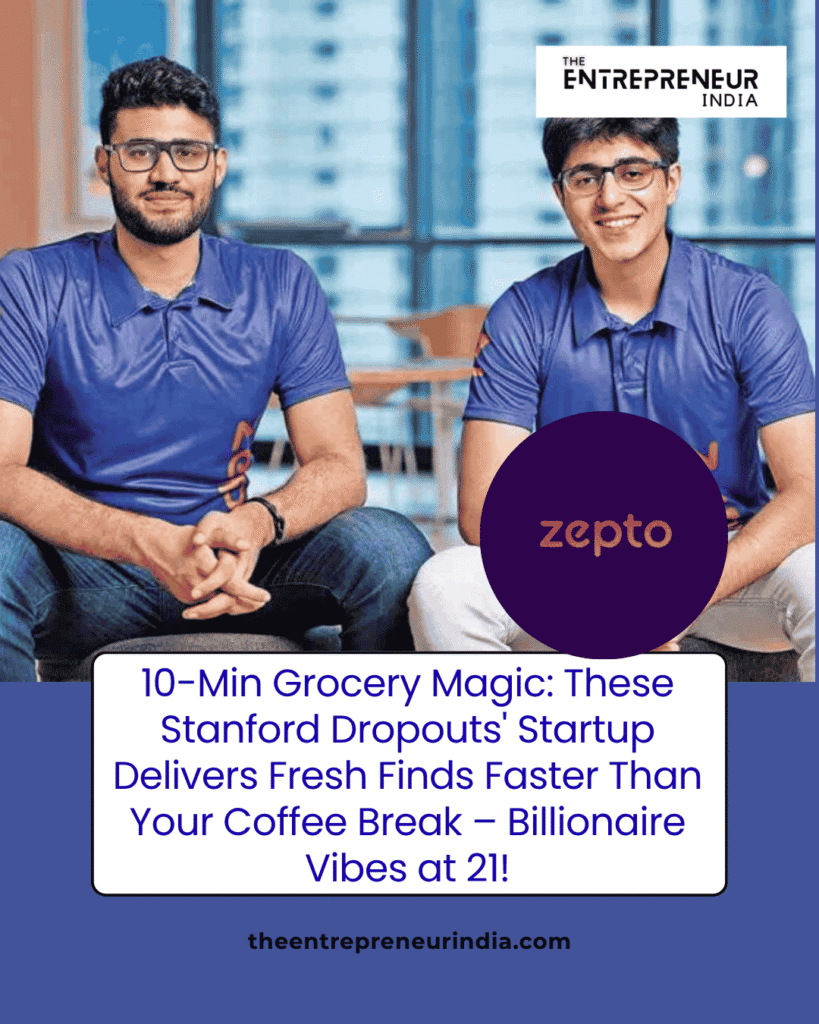Kaivalya Vohra and Aadit Palicha, two Stanford dropouts who turned a WhatsApp group into a billion-dollar startup, launched Zepto in 2021 to deliver groceries in 10 minutes or less. With FY25 revenue surging 150% to Rs 11,110 crore and a fresh $450 million funding round closing at a $7 billion valuation, Zepto now operates 250 dark stores across 10 cities, capturing 26% of India’s quick commerce market and fueling the sector’s explosive growth to Rs 6,400 crore amid urban demand for instant conveniences.
Table of Contents
Stanford Spark: Childhood Coders to College Dropouts
Kaivalya Vohra and Aadit Palicha, both Mumbai natives, met as teenagers bonded by coding projects and a shared itch for building things. Vohra, born in 2003, and Palicha, born in 2002, enrolled in Stanford University’s computer science program in 2020, but the COVID-19 pandemic pulled them back to India. Stranded in Mumbai during lockdowns, they tinkered with ideas to fix slow online grocery deliveries, which often took days.
“At 19, we were supposed to be in California, but online classes felt pointless,” Palicha recounted at the NDTV World Summit in 2025. Instead, they started a WhatsApp group to coordinate neighborly grocery runs, spotting a gap for ultra-fast service. By mid-2021, after a year of prototyping, they dropped out—Vohra at 18, Palicha at 19—to launch Zepto full-time. Their parents’ reactions mixed shock and support; Vohra’s mother reportedly burst into tears, lamenting the “beautiful life” he abandoned, though early revenue traction—millions in months—swayed skeptics.
Palicha had prior startup experience, founding GoPool, a Dubai carpool app, at 17. Vohra, the tech whiz, handled engineering. Their youth drew doubters, but as Vohra told The Times of India in 2024, “Age isn’t a disadvantage if you have substance—numbers speak louder.”
From KiranaKart to Quick Commerce King: The Zepto Pivot
Zepto evolved from KiranaKart, a 2020 venture partnering with local kirana stores for 45-minute deliveries that fizzled after 10 months due to poor product-market fit. Undeterred, the duo joined Y Combinator’s accelerator, rebranded to Zepto in July 2021, and verticalized operations with owned “dark stores”—compact warehouses stocked for 10-minute fulfillment.
The model exploded during the pandemic’s second wave, promising 5,000+ products like fresh produce, snacks, and household essentials via an intuitive app. “We built for speed and reliability, not just hype,” Palicha emphasized in a 2025 YourStory interview. Early focus on Mumbai and Bengaluru scaled to 250 stores by 2025, covering 80+ pin codes in 10 metros including Delhi, Chennai, and Pune. Features like AI-optimized inventory and rider incentives ensure 95% on-time rates, with average order values at Rs 350.
Funding Frenzy: From Unicorn to $7 Billion Valuation
Zepto raised over $2 billion across 11 rounds from 50+ investors, including Glade Brook Capital, Nexus Venture Partners, and Y Combinator. Milestones include $200 million in 2022 at $900 million valuation, unicorn status in 2023 at $1.4 billion, and $665 million Series F in June 2024 at $3.6 billion.
The latest: a $450 million mix of primary and secondary funding in October 2025, led by CalPERS with General Catalyst and Lightspeed, valuing Zepto at $7 billion—a 40% jump from $5 billion in 2024. “This reflects our execution in scaling while building leverage,” Palicha said in a company statement. Funds will expand dark stores to 500 by FY26 and enter Tier-II cities, with $900 million in cash reserves post-round.
Zepto’s Funding and Revenue Growth
| Year | Key Funding ($M) | Valuation ($B) | Revenue (Rs Cr) |
|---|---|---|---|
| 2022 | 200 | 0.9 | N/A |
| 2023 | 200 | 1.4 | N/A |
| 2024 | 665 | 3.6 | 4,454 |
| 2025 | 450 | 7 | 11,110 |
Source: Company filings and reports from VCCircle, Business Standard, and Reuters.
Rapid Scaling and Market Battles
Zepto’s FY25 revenue hit Rs 11,110 crore, up 150% from Rs 4,454 crore in FY24, with annualized gross order value nearing $4 billion—a 300% YoY jump per CEO Palicha in April 2025. It processes 20% more orders monthly, holding 26% share behind Blinkit (41%) and Swiggy Instamart (27%), per JM Financial.
Challenges include high cash burn for store setups—70% of outlets now EBITDA-positive—and labor critiques; Palicha countered Anand Mahindra’s 2022 “inhuman” speeds claim by noting average rider speeds under 15 km/h. Acquisitions like Menzzo (2024) bolstered private labels, while Super Saver discounts drive large orders.
Why Zepto Delivers: Empowering Urban India
Zepto matters by shrinking wait times for busy households, creating 20,000 jobs for riders and sorters, and supporting kirana suppliers through B2B ties. In a $20 billion quick commerce market growing 50% yearly, it levels access to fresh goods, reducing food waste via demand forecasting. The founders’ story—21-year-old Vohra (Rs 3,600 crore net worth) and 22-year-old Palicha (Rs 4,300 crore)—inspires Gen Z, landing them on Hurun’s Rich List as India’s youngest billionaires.
With an IPO eyed for late 2026 at $10 billion, Zepto plans medicine delivery and international pilots. As Palicha told Hindustan Times in 2024, “We’re building an institution for the long haul.” Their WhatsApp whim proves bold bets can blitz the market.
In a rushed world, Zepto turns errands into instants, one dark store at a time.

Also read: Empowering Motherhood: Malika Sadani’s The Moms Co. Transforms Skincare with Toxin-Free Solutions